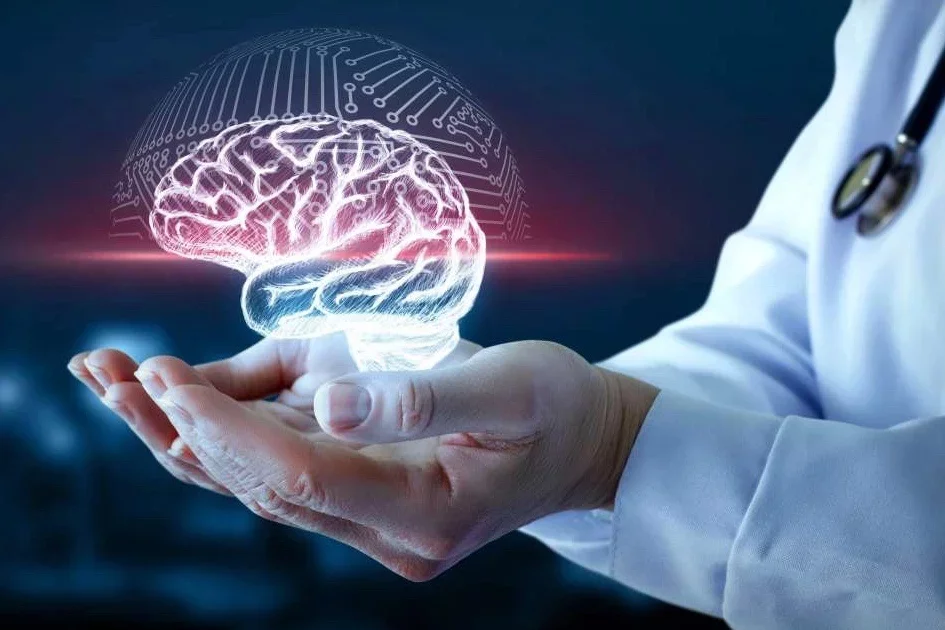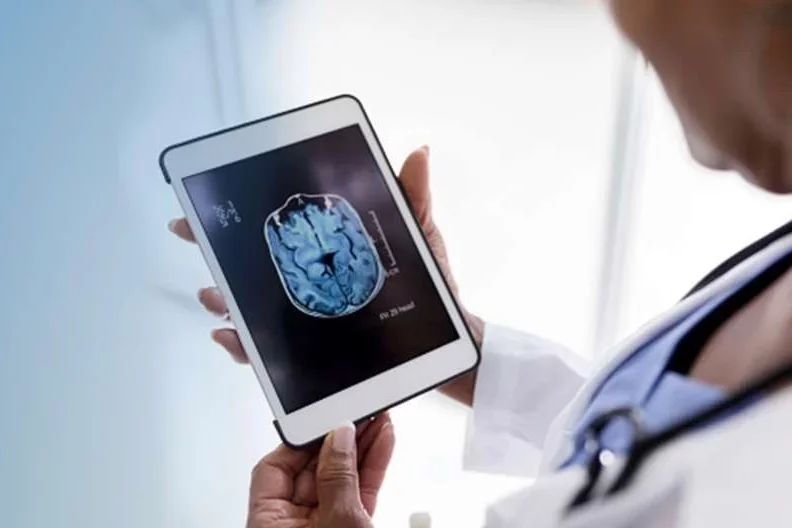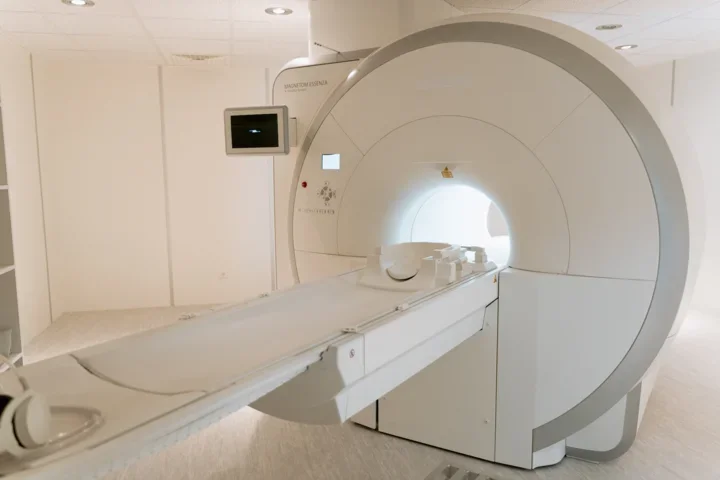Alzheimer's Vs Dementia - What Is the Difference?
Research Spotlight

What Is Alzheimer's Disease? What Is Dementia?
In this article:
- Dementia vs. Alzheimer’s
- Causes of Dementia
- Diagnosing Dementia
- Treating Alzheimer’s
- Preventing Dementia
MEET DR. DANIEL SILVERMAN
“What's more devastating than losing your cognitive abilities?"
A well-known researcher and physician, Dr. Daniel Silverman is also a distinguished professor in the Department of Molecular and Medical Pharmacology at the David Geffen School of Medicine at UCLA. Dr. Silverman's expertise lies in the field of nuclear medicine and molecular imaging and he focuses on the human brain, a topic he developed an interest in well before college: “I got very interested in brain research around the time I was in high school.”

He has conducted extensive research in the areas of positron emission tomography (PET) imaging and the development of novel radiotracers for diagnosing and monitoring various diseases, including Alzheimer's disease, brain tumors, and neurodegenerative disorders. His work focuses on using advanced neuroimaging techniques to understand the underlying biological processes of these conditions and improve their diagnosis and treatment.
“Because I was interested in doing brain research, I wanted to be able to study the brain at its most fundamental level. And the most powerful tools for looking at the living human brain were in nuclear medicine.”
Dr. Silverman has made significant contributions to the field of molecular imaging and has published numerous scientific papers in prestigious journals. He has also received several awards and honors for his research contributions.
Now, in honor of Alzheimer's and Brain Awareness Month, Dr. Silverman breaks down the difference between Alzheimer’s disease and dementia, discusses the most effective way to diagnose different neurodegenerative diseases, and outlines some proven strategies that can help prevent dementia.
What Is the Difference Between Alzheimer’s and Dementia?
Alzheimer's disease and dementia are related but distinct terms:
- Dementia is a general term used to describe a set of symptoms that affect cognitive abilities, memory, thinking, and behavior. It is not a specific disease but rather an umbrella term for a group of symptoms.
- Alzheimer's disease is the most common cause or type of dementia, accounting for the majority of cases. It is a progressive neurodegenerative disorder that primarily affects memory and cognitive functions.
In summary, dementia is an overarching term that refers to a range of symptoms affecting cognitive abilities, while Alzheimer's disease is a specific type of dementia characterized by progressive memory loss and cognitive decline. Other types of dementia exist, each with its own distinct causes and characteristics.
What Are the Other Common Causes of Dementia?

While Alzheimer’s disease is the most common, there are several other causes of dementia, including but not limited to vascular dementia, Lewy body dementia, and frontotemporal dementia (FTD).
- Vascular dementia is the second most common cause of dementia. It occurs as a result of reduced blood flow to the brain, typically due to small strokes or other vascular issues. The damage to the brain from these blood flow problems leads to cognitive impairment.
- Lewy body dementia is characterized by the presence of abnormal protein deposits called Lewy bodies in the brain. It shares some symptoms with both Alzheimer's disease and Parkinson's disease, including cognitive decline, visual hallucinations, fluctuating alertness, and movement problems.
- Frontotemporal dementia (FTD) refers to a group of disorders caused by the degeneration of the frontal and temporal lobes of the brain. FTD affects personality, behavior, and language skills. It can lead to changes in social behavior, impulsivity, language difficulties, and problems with executive functioning.
- Mixed dementia refers to a combination of different types of dementia, typically Alzheimer's disease and vascular dementia. Mixed dementia is particularly common in older adults. The presence of multiple types of dementia can complicate the symptoms and progression of the condition.
“Biologically these different conditions are defined by which abnormal proteins are distributed in which parts of the brain.” And, according to Dr. Silverman, the symptoms of these different types of dementia usually correlate to the part of the brain that’s being affected.
“With Alzheimer’s, the main variation of the symptoms is determined by whether it hits the left side of the brain first, or the right of the brain first,” he explains. “If it's hitting the left side of the brain first, you'll have language predominant symptoms. If it's hitting the right side of the brain first, you might emerge mostly with visuospatial types of symptoms.”
It’s different for other types of dementia. “A lot of these other conditions are much more random where they start, and the symptoms will be predominant based on where they're happening first.”
“For frontal temporal dementia, it may primarily affect the frontal part of the brain or the temporal part—which is the bottom half of the back part of the brain—or it might affect both areas. But it’ll present very different clinically. For example, if it’s primarily the frontal part of the brain that’s involved, there may be a lot of personality and behavioral type changes out of proportion to memory type of changes.”
It's important to note that other causes of dementia exist, such as Parkinson's disease, Huntington's disease, and Creutzfeldt-Jakob disease. Additionally, some causes of dementia are reversible if identified and treated early, such as certain medication side effects, infections, metabolic disorders, or nutritional deficiencies. A proper diagnosis by a healthcare professional is crucial to determine the specific cause of dementia and develop an appropriate treatment and management plan.
How Do Doctors Determine What Causes Dementia?

“When doctors say ‘you have dementia’ or ‘you have some kind of mild impairment’ that's not a diagnosis. That's like saying ‘someone's bald’ or ‘someone has thinning hair.’ No, the real question is: What’s causing this? Is it a genetic thing? Is it a nutritional deficiency? Is it some kind of infection? That is the real diagnosis.”
And determining the underlying cause of dementia involves a comprehensive evaluation. The diagnostic process typically includes the following steps:
1. Medical History: The doctor should begin by taking a detailed medical history, including information about the patient's symptoms, the progression of cognitive decline, and any associated medical conditions. They may also inquire about family history, medication use, past medical procedures, and lifestyle factors.
2. Physical Examination: A thorough physical examination is conducted to assess overall health and identify any potential underlying medical conditions or neurological abnormalities that could contribute to cognitive impairment.
According to Dr. Silverman, this is almost always the best place to start: “You want the patient to have a good history and physical to decide whether or not it's appropriate for them to get a test.”
3. Cognitive and Neuropsychological Testing: Doctors often administer specific tests to evaluate cognitive functions, memory, attention, language, problem-solving, and other mental abilities. Neuropsychological testing can help identify patterns of cognitive impairment and provide insights into potential underlying causes.
However, Dr. Silverman believes these types of tests are limited in their capability as a diagnostic tool: “Neuropsychological tests don't really have a lot of accuracy in determining what’s causing the symptoms, but they can help grade the severity of the patient’s condition and better clarify the clinical problem.”
4. Laboratory Tests: Blood tests may be performed to assess various factors that could contribute to dementia symptoms, such as vitamin deficiencies, thyroid function, kidney and liver function, and the presence of infections or metabolic disorders. “They should get lab tests to determine if things like hypothyroidism, nutritional deficiency, electrolyte imbalance, or anemia might be causing some of the symptoms.”
But Dr. Silverman says lab testing, while important, is unlikely to be the magic bullet that solves the patient’s cognitive issues: “These types of tests often incidentally find things that are making the patient’s condition worse. But rarely—at most 1% of the time—is something potentially reversible found that is then treated and the treatment then restores the person to a normal level of cognition.”
And then there is the final but most important step…
5. Brain Imaging: Imaging techniques, such as magnetic resonance imaging (MRI) or computed tomography (CT) scans, can help visualize the brain's structure and identify any abnormalities, such as shrinkage, strokes, or the presence of tumors. However, specialized brain imaging techniques like positron emission tomography (PET) scans can provide further insights into specific diseases or conditions associated with dementia: “Once you find whatever you can find, you treat whatever you can treat, and the patient still is not back to their normal level of cognitive capability, then those patients should be referred for another test, and the single best test at that point would be a brain PET scan.”
This is where Dr. Silverman believes the most progress can be made in the diagnosis and treatment of dementia: “In terms of making an accurate diagnosis as early as possible, there's nothing as powerful as PET imaging.”
According to Dr. Silverman, PET imaging is indeed the solution to a longstanding problem with properly diagnosing Alzheimer’s and other types of dementia: “What happened in the past is that doctors relied on the over generalization of the different symptoms. If it seemed that memory was affected more than behavior, they would diagnose Alzheimer's and vice versa for frontal temporal dementia. That approach turned out to be very unreliable,” he reveals. “Autopsy studies have shown that a lot of people who really had frontal temporal dementia were misdiagnosed as having had Alzheimer's disease.”
Just how many people were misdiagnosed? “In the absence of these powerful tools, autopsy results showed that the Alzheimer’s disease diagnosis was only right about 60-70% of the time. Now that has increased to 90% or above because we can actually see the Alzheimer's in the brain.”
How Is Alzheimer's Diagnosed?

Doctors use established diagnostic criteria to evaluate whether the individual's symptoms meet the benchmarks for a diagnosis of Alzheimer's disease. These criteria consider the nature and progression of cognitive decline, the presence of memory impairment, and the exclusion of other potential causes of dementia.
The diagnostic criteria, however, are always evolving based on new findings and research. “When I started, at least two or more cognitive domains had to be affected. It couldn't just be memory problems. Something else—like abstract reasoning or visual/spatial skills or judgment or executive function—also had to be affected,” Dr. Silverman explains. “And it had to be so severe that it interfered with the patient’s ability to function in a personal, professional, or social setting.”
Unfortunately, this meant a lot of people with Alzheimer’s didn’t get the diagnosis and treatment they needed early enough: “This idea of needing two or more cognitive domains… Why is the right number two as opposed to three as opposed to one? In fact, before it's two, it is usually one, and that first one is usually memory. So having that definition basically ensured that people would only be diagnosed at a relatively late stage of the disease, after they had progressed from one to two and it interfered with their ability to function.”
Today, however, the definition and diagnostic criteria have changed: “In the most recent diagnosis, dementia isn’t even a category anymore. Instead doctors will diagnose a major neurocognitive disorder if one cognitive domain is affected and there is some level of interference with the ability to function. This is distinguished from a mild neurocognitive disorder where cognition is affected but the patient is still able to function in all their normal ways.”
Yet Dr. Silverman is quick to point out that measuring the severity of the cognitive decline from a clinical perspective can be highly subjective, especially if physicians don’t ask the right questions: “If you ask the patient ‘How has your memory been?’ what you get is an answer that corresponds more than anything to their mood state. What you really want to know is, ‘How is your memory now compared to how it was one year ago, 2 years ago, 5 years ago, 20 years ago, and when you were 20 years old?’
He also cautions against the tendency to compare a patient’s cognitive function with other people in their age range since that’s not a meaningful way to measure decline. “Someone who was very high functioning to begin with can lose quite a bit of their biological brain function before they would fall outside the normal range for people their age.”
Once the clinical diagnosis has been made, then a PET scan should be ordered. “For Alzheimer's to meet the traditional diagnostic criteria, after having met the clinical criteria, you have to show that there are abnormal levels of plaques (which we now know to be made of a form of amyloid protein) and an abnormal distribution of tangles (which we now know to be made of a form of tau protein) in the brain.”
But it’s not enough to simply show the presence of these proteins, according to Dr. Silverman. “You don't want to just know if the amyloid protein is there,” he explains. “You want to know if it's causing the problems with brain function that are responsible for the patient’s symptoms.”
Indeed, many people who have these proteins in the brain will not show any signs of cognitive decline or impairment: “There were these studies where they followed nuns from the time that they entered the convent at 18 to the time of their death. They had agreed to have autopsies done, and the researchers found nuns whose brains were full of amyloid but were still sharp and cognitively intact when they passed away.”
That's why determining presence of abnormal amyloid (whether by imaging or cerebral spinal fluid measurements) isn't enough. It's only when the presence of amyloid is accompanied by neurodegeneration leading to a specific kind of brain dysfunction—which can be measured directly using PET with the radioactive sugar fluorodeoxyglucose (FDG), a test covered by Medicare—that Alzheimer's disease can be positively diagnosed.
What Kind of Doctor Diagnoses and Treats Dementia?
The following professionals are commonly involved in the diagnosis and management of dementia:
- Primary Care Physician (PCP): Many cases of dementia are initially evaluated and diagnosed by primary care physicians, such as family doctors or internists. PCPs can conduct initial assessments, perform physical examinations, review medical history, and order basic laboratory tests. They may also provide ongoing management and coordinate referrals to specialists if needed.
- Neurologist: Neurologists specialize in the diagnosis and treatment of diseases and disorders of the nervous system, including dementia. They have expertise in evaluating cognitive function, interpreting imaging studies (such as MRI, CT, or PET scans), and assessing neurological symptoms. Neurologists can diagnose different types of dementia and develop appropriate treatment plans.
- Geriatrician: Geriatricians are doctors who specialize in the care of older adults. They have expertise in managing the unique health concerns of older individuals, including dementia. Geriatricians may conduct comprehensive assessments, coordinate care, and provide specialized treatments or recommendations tailored to the specific needs of older adults with dementia.
- Neuropsychologist: Neuropsychologists are psychologists who specialize in the assessment of cognitive and psychological functioning. They administer detailed neuropsychological tests to evaluate cognitive abilities, memory, attention, language, and other mental functions. Neuropsychological testing can help determine the extent and patterns of cognitive impairment and assist in diagnosing and monitoring dementia.
- Psychiatrist: Psychiatrists are medical doctors who specialize in mental health and psychiatric disorders. They may be involved in the diagnosis and treatment of dementia, particularly in cases where behavioral and psychiatric symptoms are prominent. Psychiatrists can prescribe medications and provide counseling or psychotherapy to manage the psychological aspects associated with dementia.
Is There Treatment for Alzheimer's Disease?

“Alzheimer's, if you start early, is a very treatable condition.”
While there is no cure for Alzheimer's disease, there are treatments available that can help manage the symptoms and slow down the progression of the disease. The treatment approach for Alzheimer's disease typically involves a combination of medication, supportive therapies, and lifestyle modifications.
- Medications: Several medications are approved by regulatory authorities to treat Alzheimer's disease. These medications can help manage symptoms such as memory loss, confusion, and changes in thinking. They work by regulating certain chemicals in the brain, mainly a neurotransmitter called acetylcholine.
- Supportive Therapies: Various supportive therapies can help individuals with Alzheimer's disease maintain their cognitive abilities, manage behavioral symptoms, and enhance their overall well-being. These therapies may include cognitive stimulation programs, occupational therapy, speech therapy, and reminiscence therapy. Support groups and counseling can also provide emotional support to both individuals with Alzheimer's and their caregivers.
- Lifestyle Modifications: Certain lifestyle changes can potentially improve the quality of life for individuals with Alzheimer's disease. Regular physical exercise, a healthy diet, and sufficient sleep are important for overall well-being. Structured routines, maintaining a safe and familiar environment, and using memory aids like calendars or reminder systems can also be beneficial.
- Care and Support: Alzheimer's disease often requires long-term care and support, and it is crucial to involve caregivers and provide them with resources and assistance. Caregiver support programs, respite care services, and home healthcare services can offer assistance in managing the challenges associated with caregiving and maintaining the individual's safety and well-being.
“One of the most harmful misconceptions that's not only shared by patients, but even physicians, is that if you have Alzheimer’s, there’s not really much we can do about that,” Dr. Silverman laments. “But there's all sorts of data that shows if you start at an early point in the right people—the people whose brain PET shows that early Alzheimer's is really what's causing their symptoms—there are things you can do, including prescribing drugs that can stabilize them for 1-2 years at least.”
Additionally, research continues to advance our understanding of Alzheimer's disease, and there are ongoing efforts to develop new treatments and interventions that may modify the course of the disease or provide a cure.
How to Prevent Dementia

While there is no guaranteed way to prevent dementia, certain lifestyle choices and behaviors may help reduce the risk or delay the onset of cognitive decline: “There is a lot you can do to stall Alzheimer's symptoms for years,” Dr. Silverman confirms. “And prevention is largely related to lifestyle choices.”
Get Moving
Engage in regular physical exercise, which has been associated with a lower risk of cognitive decline. “It surprises a lot of people, but empirical data shows the single most effective way to prevent dementia isn’t using your brain, but it's using the rest of your body,” Dr. Silverman reveals. “Cognitive exercise isn't bad, but it's not nearly as powerful as physical exercise. If you're just going to focus on one or the other, you're better off taking a 30 minute walk than spending 30 minutes doing the New York Times crossword puzzle.”
Why is physical exercise so important? It’s primarily related to release of factors that stimulate the growth of new neurons or synapses such as a protein called abrineurin or BDNF (brain-derived neurotrophic factor). According to Dr. Silverman, “Even if you are in the early stages of the disease, enough physical exercise will release these nerve growth factors in your brain and help replace the damaged neurons.”
Eat Healthy Foods
“The other thing that's really important is the right kind of nutrition,” Dr. Silverman insists. “Because even if you have those aforementioned growth factors, they can’t forge new brain connections without the proper building blocks.”
And that means adopting a balanced and nutritious diet that includes lean proteins and healthy fats as well as plenty of fruits and vegetables. Dr. Silverman explains why each of these food groups is so important.
Protein: “You want to have a well-balanced diet but you especially want to make sure you're getting at least a minimum amount of protein. That’s because almost all the major neurotransmitters—the chemicals that allow one neuron in the brain to connect with the next neuron—are based on amino acids.”
How much protein is enough? “For an average-sized person who isn’t doing anything active, they should get at least 50 or 60 grams a day. But a person who’s active could double that amount, and someone doing vigorous exercise might even triple it.”
The kind of protein you eat also makes a difference according to Dr. Silverman: “Plant-based protein has less of one particular amino acid that might not be so good for you.”
However, he says quantity is more important than quality when it comes to protein intake. “It takes more effort to get enough protein if it's plant-based so it’s fine to have some animal protein as well.”
Fats: “What’s proven to be the most valuable for brain function is fish, which is a good source of both protein and fat,” he says. “Fishes like salmon, mackerel, tuna, sardines, and anchovies have particularly high contents of omega-3 and omega 6 fatty acids.”
Fruits and Vegetables: “In addition to the proteins and the fats, you need to get micronutrients, preferably from at least 4 or 5 servings of fruits or vegetables every day. If you can’t hit that target, I would encourage people to go ahead and take a multivitamin to supplement their diet.”
“With the right fats and the right proteins and adequate micronutrients, you have the building blocks required for optimal brain function.”
Other Lifestyle Choices
Get Quality Sleep: Prioritize good sleep habits, as poor sleep and sleep disorders have been associated with an increased risk of cognitive decline. Aim for sufficient, restorative sleep each night.
Avoid Smoking and Limit Alcohol Consumption: Smoking has been linked to an increased risk of cognitive decline and dementia. Quitting smoking is beneficial for overall health. Limit alcohol consumption, as excessive alcohol intake can also increase the risk of cognitive impairment.
Protect the Brain: Protecting the brain from injury is important. Wear seat belts while driving, use helmets during sports activities, and take precautions to prevent falls, as head injuries can increase the risk of dementia.
Manage Chronic Conditions: Effectively manage chronic conditions like diabetes, hypertension, and high cholesterol, as these conditions can increase the risk of cognitive decline. Follow the treatment plans prescribed by healthcare professionals and maintain regular check-ups.
Stay Mentally and Socially Active: Engaging in mentally stimulating activities, such as reading, puzzles, learning new skills, or pursuing hobbies, may help preserve cognitive function. Stay socially connected and maintain an active social life, as social engagement has been associated with a reduced risk of cognitive decline.
While these lifestyle factors may help reduce the risk of dementia, they do not guarantee prevention. Some individuals may still develop dementia despite practicing these measures, and others who do not follow these guidelines may not develop the condition. Additionally, certain forms of dementia—such as those caused by genetic factors or underlying medical conditions—may not be preventable through lifestyle changes alone.
Don’t Give Up

One of the biggest problems patients face when they start experiencing symptoms of dementia is that many people—including physicians—don’t really understand the difference between normal signs of aging and the changes associated with a neurodegenerative disease like Alzheimer’s.
“If a 70- or 80-year-old says, ‘My memory doesn't seem to be as good as it used to be…’ they’re often told ‘Well, that's not so unusual at your age.’ But that really is the wrong answer because in studies where they've looked at people with normal, healthy aging, there's very little that changes in terms of cognitive abilities over time other than processing speed.”
So what’s the best course of action? If you know that you're different than you have been, make sure that you get to a positive explanation,” says Dr. Silverman. “Don’t accept no answer as the answer.”
Alzheimer's and Brain Awareness Month
Alzheimer's and Brain Awareness Month is dedicated to raising awareness about Alzheimer's disease, brain health, and other related neurological conditions, including dementia. The goal is to promote understanding, encourage early detection, support ongoing research, and advocate for improved care and support for individuals and families affected by these conditions. Throughout June, various organizations and advocacy groups conduct campaigns, educational programs, fundraising events, and community activities to increase public awareness and engage in efforts to fight against Alzheimer's disease and other brain-related disorders.



